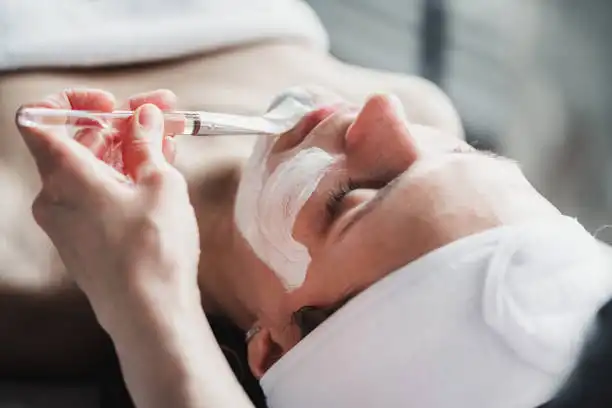How Biotin Affects Skin Health and Hydration
Biotin plays a crucial role in maintaining healthy skin by supporting the production of fatty acids. These fatty acids are essential for keeping the skin moisturized and nourished. When your body has adequate biotin levels, it can more effectively:
- Promote skin cell regeneration
- Enhance skin barrier function
- Improve skin hydration and elasticity
- Support overall skin health
Research suggests that biotin deficiency can lead to various skin issues, including red, scaly rashes and dermatitis. By ensuring sufficient Biotin powder intake, you may help prevent these skin problems and maintain a healthier, more radiant complexion.
Biotin also contributes to the production of keratin, a protein that forms the primary structure of skin, hair, and nails. Adequate keratin levels can result in smoother, more supple skin with improved texture and appearance.

Can Biotin Help Reduce Acne and Skin Issues?
While biotin is not directly marketed as an acne treatment, some evidence suggests it may indirectly contribute to improving skin conditions, including acne. Here's how biotin might help:
Biotin, also known as vitamin B7, plays a crucial role in supporting healthy skin, particularly when it comes to acne prevention and healing. One of the ways biotin can help is by regulating oil production in the skin. It aids in balancing fatty acid metabolism, which can reduce the overproduction of sebum — the oily substance that often contributes to clogged pores and acne formation. By keeping oil levels in check, biotin helps minimize one of the primary causes of breakouts.
In addition to controlling oil production, biotin supports skin healing by promoting cell regeneration. This helps accelerate the repair of existing acne lesions, reducing inflammation and minimizing the chances of scarring. Biotin’s ability to enhance skin regeneration is essential for clearing up acne and preventing long-term damage to the skin’s appearance.
Furthermore, biotin strengthens the skin's natural barrier. A robust skin barrier is better equipped to defend against environmental stressors, pollutants, and bacteria, all of which can trigger or worsen acne. A strong barrier helps keep harmful agents out, allowing the skin to stay healthier overall.
Some research also suggests that biotin feed additive may play a role in regulating hormones, particularly those linked to acne flare-ups. By influencing hormone levels, biotin could help alleviate hormonal acne, which is often seen during puberty, pregnancy, or periods of hormonal imbalance. This combination of benefits makes biotin an important nutrient for maintaining clear and healthy skin.
It's important to note that while biotin may offer these potential benefits, it should not be considered a standalone solution for acne or other skin issues. A comprehensive skincare routine and a balanced diet are crucial for maintaining healthy skin.
Top Biotin-Rich Foods and Supplements for Glowing Skin
To harness the potential skin benefits of biotin, you can incorporate biotin-rich foods into your diet or consider supplements. Here are some excellent dietary sources of biotin:
- Egg yolks
- Nuts (especially almonds and peanuts)
- Seeds (such as sunflower seeds)
- Sweet potatoes
- Avocados
- Salmon and other fatty fish
- Whole grains
- Leafy green vegetables

For individuals who find it difficult to get enough biotin from their diet, supplements can provide a convenient alternative. Biotin supplements are widely available in several forms, such as capsules, tablets, soft gels, and even gummies, making it easy for people to choose the option that suits their preferences. While supplements can be an effective way to increase biotin intake, it's important to remember that taking too much of any supplement can have unintended consequences. Therefore, before starting a new supplement regimen, it's always advisable to consult with a healthcare professional. A doctor can help determine the appropriate dosage and ensure that biotin supplements won’t interact with any other medications or conditions.
One particularly effective form of biotin supplementation is biotin powder. This versatile product offers several advantages:
- Easy to incorporate into drinks, smoothies, or food
- Allows for precise dosage control
- Often more cost-effective than other supplement forms
- Typically free from additives or fillers
Introducing HSF Biotech's Pure Biotin Powder
At HSF Biotech, we're proud to offer a high-quality, pure biotin powder that can support your skin health goals. Our biotin powder is:
- Composition: 100% pure D-Biotin (Vitamin B7)
- Physical properties: Fine, white to off-white crystalline powder
- Chemical properties: Highly stable, water-soluble
- Purity: Minimum 98% pure
- Manufacturing: Produced through advanced microbial fermentation technology
Our biotin powder is ideal for those looking to support not only their skin health but also hair growth, nail strength, and overall metabolism. As a biotin feed additive, it's also suitable for use in animal nutrition, demonstrating its versatility and high quality.

In conclusion, while biotin is not a miracle cure for skin issues, it plays a significant role in maintaining overall skin health. By ensuring adequate biotin intake through diet or supplements like our pure biotin powder, you may experience improvements in skin hydration, texture, and appearance. Remember, healthy skin is a result of a comprehensive approach that includes proper nutrition, skincare, and lifestyle habits.
For more information about our biotin powder and how it can support your skin health journey, please don't hesitate to contact us at aaron@healthfulbio.com. Our team of experts is ready to answer your questions and help you make informed decisions about your skin health.

